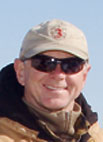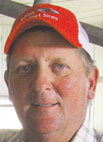
It is one of those days. The rain pounds the top of his truck, the sky looms dark and dreary and water gushes over the cement bridge he must cross to get to his cattle. Still Beau Davis’ spirits beam bright. People who know Beau will tell you that’s just the way he is, always moving forward with upbeat determination.
Beau has always held a place in his heart for the farm. He grew up one of 12 children in Hartville, Mo., respecting his father’s tireless work ethic. “My dad, he farmed about 1,000 acres and milked cows… he did whatever he had to do to feed 12 kids,” reflected Beau.
Though Beau loved the farm and cattle as a child, he didn’t start farming until 2006, after completing a 28-year career as a meat cutter and manager for a grocery store chain in Springfield, Mo. He started with 20 commercial cows and now, just seven years later, the herd has snowballed. Davis Farms runs 320 momma cows, 20 heifers and 6 bulls, on more than 1,000 acres throughout the Ozarks. He also owns Beau’s Black Angus Farm, which consists of 20 registered Angus cows. “We are living in an economy and day in which you have to have the numbers to make the dollars. In the past, you could take 50 cows and make a percent; now you probably have to have 100 cows to make the same percent. They cost more, it costs more to feed them; everything you do costs more. So you have to have more to pay the bills,” Beau explained. For years, Beau put everything he made back into his cattle herd, growing it exponentially over time.
He utilizes his background and expertise as a meat cutter to guide some of his farming decisions. He chooses to buy Angus-based cows and uses mostly registered Angus bulls and occasionally Hereford or Simmental bulls. His dedication to Angus stems from time he spent in meat packing plants. He recalled a particular conversation with the manager of a lead packing plant in Nebraska. “In that conversation we were talking about the grades, prime, choice and all this and he said that 85 to 90 percent of the graded prime was Angus or pretty much Angus, so that told you that they have the quality,” said Beau.
When it comes to caring for his cows, Beau feeds hay and just enough grain to condition his cattle to come into the lots when he calls them. He rotates the cattle in pastures full of fescue. He sells around 200 feeder calves each year. Beau gives the feeder calves around two-pounds of grain a day for 60 to 90 days. He said that, combined with good grazing pastures, gives him the gain he wants on his feeder calves.
One thing you notice right away when looking at Beau’s herd is all his cattle have an ear tag in each ear. Beau double tags his herd for two reasons. First, if a cow loses one of the tags, she still has one. Secondly, Beau’s cows are easier to identify if they accidentally get out into the neighbor’s pasture. He also adds the cow’s birth year to the tags, so he can determine their age with a glance. Beau said he is not an expert on farming; the key to his success is information. “I just talk to other farmers, ask a lot of questions. I read all the articles I can about farming and sift out the things that work for me,” said Beau.
Beau has three adult sons, and two daughters ages 16 and 5. One of his sons and one full-time farmhand help him care for his large herd. Farming is just one of Beau’s passions. He also owns and operates Advanced Lawn Care and Springfield Irrigation. He holds two national championships with his coon dogs and loves to hunt quail. “I will have a bird dog and a coon dog and black cattle until the day I die, that’s how I feel,” concluded Beau.







